(www.blog.ted.com)
An intriguing proposition, no? I have just watched this TED talk by Amy Cuddy, called “Your Body Language Shapes Who You Are”, after my excellent friend Elli Harris sent me a link to the Top Ten TED Talks Women Should See (they should). Cuddy isn’t actually talking about beauty but power, and how your body language can make you not just look more powerful, but actually feel more powerful – and as a result, be more powerful. But I kept wondering about the body language of beauty, and whether the same principle might apply.
Cuddy, who is a social scientist, says that humans and animals the world over express power and dominance in the same way: by making themselves big. When we feel powerful we stretch out, take up more space. And when we feel powerless, lacking in confidence, we close up, wrap our arms around our bodies and make ourselves small. Even blind people, who have never learned this by seeing others do it, use the same body language.
I think there is a body language of beauty, and it’s related to that of power. Think of a peacock strutting, and compare with a Victoria’s Secret model. In fact, think of modelling generally: surely the poses and style of walking that models learn are the non-verbal display of beauty? All the people taking duckface selfies are using this language too.
That suggests that you can learn this body language. Cuddy shows that you can learn the body language of power, and by holding a “power pose” for just two minutes (e.g. Wonder Woman hands on hips), your power hormone testosterone levels rise, and stress hormone cortisol levels drop. This means that you actually feel more confident, and are likely to perform better in whatever you are doing. Pretty cool, right?
So maybe we can all learn some non-verbal signs of beauty and, as Cuddy says, “Fake it till you make it” or better still, “Fake it till you become it”. Have you ever known someone who was not, in your eyes, particularly good-looking but carried themselves as if they were, and had admirers all over them? I’ve sought out a few famous examples of this, although I recognise that it’s a subjective view. I certainly don’t mean to be passing judgement on people’s looks here, just observing the body language of famous people who are widely considered to be ‘not conventionally good-looking’.
The inimitable SJP (www.theimproper.com)
Jagger (www.timesunion.com)
Bowie, of course (www.metro.co.uk)
Point made. (www.landlordrocknyc.wordpress.com)
I also think that the body language of beauty is one of the ways we learn how to be feminine, but this is where my theory encounters a problem: Cuddy says that women in general use less powerful body language than men, tending to make themselves smaller. If you think about how little girls are taught to keep themselves neat and tidy, legs crossed and arms in, this makes sense. When Cuddy showed images of powerless poses in her talk, I recognised all my usual positions.
So is the body language of beauty one of power or feminine submission? I think it’s both, coexisting in a delicate balance. For instance:
Scarlett doing powerful (www.newsbiscuit.com)
And the opposite – but still beautiful (www.hdwallpaperscool.com)
In the second image, Ms Johansson is clearly making herself smaller, but her facial expression is pretty confident. And that’s just it: beauty’s body language is about the performance of desirability, which for feminine beauty often means a position of weakness performed with confidence. Because submission is feminine, and confidence is sexy, right?
I suspect that it would be an entire social sciences research project to get to the bottom of this (anyone fancy a collaboration?), but I’m convinced that beauty is in body language as well as body shape. What do you think – does that mean we can learn to feel (and be seen as) beautiful, and is that a good thing?

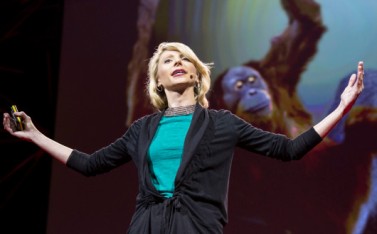
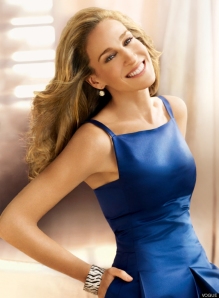
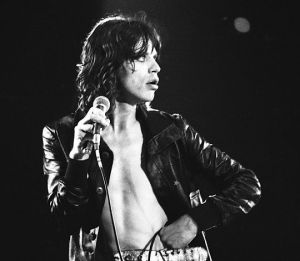
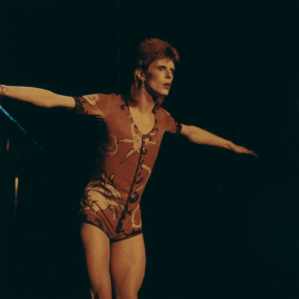
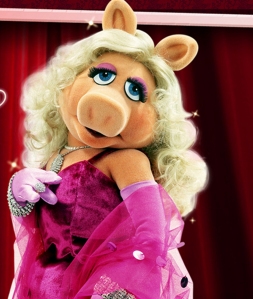
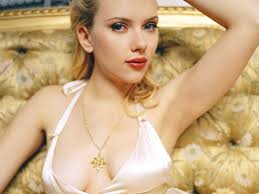


March 18th, 2014 at 7:03 pm
Interesting piece. I think I’ll reblog for my Wednesday post. And maybe write a later post with my own thoughts, linking back to this. Here are some of my thoughts right now:
Both women and men are taught that sexuality is connected to male dominance and female submission. You see it performed over and over again in sex play.
At the same time, surveys show that young men want to be in relationships with women who are their equals. And women who take the submissive role in sex play often want men to see them as equals in real life.
And, from what I’ve heard from guys, they are attracted to women who are confident, willing to have sex with them, but not women who intimidate them — which could make it hard to “get it up.” So I’m not sure that attractive women necessarily have to be submissive. That second picture of Scarlet Johansen seems to embody both confidence and interest in sex and a lack of intimidation.
March 19th, 2014 at 11:31 am
Thanks! It is confusing, isn’t it? Confidence and submission seem strangely intertwined when it comes to feminine beauty – perhaps it’s just another one of the many paradoxes we have to negotiate. Your perspective on what people actually find attractive is interesting too: it would be great to study not just the way ‘power posing’ or even ‘beauty posing’ (duckface?!) makes you feel, but also how it makes others see you.
March 19th, 2014 at 8:34 am
Reblogged this on BroadBlogs and commented:
Can body language create beauty? And how so? Are men turned on by confidence? Or submission? Some mix of the two? Or something else?
March 19th, 2014 at 9:08 am
I absolutely agree with your fundamental premise, that body language can be beautiful. Your title is “Can you fake beauty?” and I think the answer is no. It’s a bit like that old quote: “The most important thing for an actor is sincerity. If you can fake that, you’ve got it made.”
There are some women who (as you say) are not conventionally beautiful, but the way they hold themselves, move, stand, walk, and so forth, is beautiful. The main theme of this post is confidence, which I totally understand. Big, bold, upright, open postures broadcast an air of confidence, which can be attractive. However, some women can portray elegance, refinement, delicacy, subtlety and poise, using only body language, and this is an entirely different set of messages (though incredibly attractive and beautiful nonetheless).
Can you fake it? I don’t really think so. I think that would be crude mimicry. I think for some people it’s basically innate. Others can learn to mimic the broad strokes, but I tend to think that body language is an outer reflection of inner feelings, rather than the other way around.
March 19th, 2014 at 11:36 am
Thanks for commenting! I think you’re right, it’s not as simple as just faking beauty through body language – perhaps ‘faking’ is the wrong word, and it’s really more about developing confidence to make the most of your own beauty. Does that sound better?
It’s also a question of how we define beauty. Is it the same as sexiness, or attractiveness? If so, then I think you can enhance those things with body language, but I agree with you that beauty is more than that.
Do you agree with Amy Cuddy that our body language can change the way we feel, rather than just reflecting it? I think it’s an intriguing possibility…
March 20th, 2014 at 11:00 am
Hi Carina,
I am reluctant to use actresses as examples of female body language, since by their nature they are deliberately acting out a role. However, there are few other female celebrities we could easily compare notes on.
My first example would be Connie Nielsen in “Gladiator”. Her body language in the film speaks of elegance and authority. She is not threatening, or larger than life, but portrays utter self-confidence in a way that makes you absolutely believe she was born to rule an empire. In the director’s commentary, Ridley Scott says he chose her immediately because of the presence she brings to the role.
My second example is Christina Hendricks in “Mad Men”. She isn’t (at least to my eyes) exceptionally beautiful to look at. However, she has the detached poise and haughtiness of a tiger: exceptional self-confidence, and the look of a hungry predator who eats men for breakfast. The way she moves and holds her body exudes sex appeal, but also says: you’re not coming near me unless you are man enough to subdue me. She can also express scorn and cruelty with one glance of those half-lidded eyes.
Both these women have flashes of vulnerability in their roles, which may add to their sexual appeal.
I personally believe that mere physical beauty is different from sexiness, and different again from attractiveness, although there is of course some overlap. Being pleasing to look at isn’t the same as being sexually desirable. And for me, attractiveness is found in a mixture of confidence and intelligence.
I do think that deliberate use of body language can change the way we feel, in the way that a new outfit, or a new hairstyle can make us feel better and more confident in ourselves. I think the adoption of confident body language will, over time, alter the way others see us, which in turn improves our self-confidence as people treat us subtly differently.
Apologies for the rambling comment.
Vivienne.
March 20th, 2014 at 11:32 am
Hi Vivienne
I agree that actresses use body language differently from most people, and more consciously. But perhaps they are a good example of how body language (along with changes in appearance, speech etc.) can completely alter how an actress/actor is judged as beautiful or attractive: Christina Hendricks in another role might not be sexy at all, and I think body language is an important part of an actor’s toolkit in achieving this.
But I wouldn’t want to imply that we should all be ‘acting’ out confidence or sexiness… although in her TED talk Amy Cuddy does say that pretending to be confident can actually make you feel more confident, and I think that’s great – it’s learning how to be confident, rather than ‘faking’ it.
I guess what really intrigues me is how much of a difference it makes if you carry yourself as if you are beautiful, which I think means with confidence, elegance (?) and poise. If you act beautiful, will you appear more beautiful than you might otherwise? I don’t really have an answer, but I suspect it does make a difference!
March 24th, 2014 at 6:58 am
I agree with you. If you pluck Michelle Dockery out of Downton Abbey and put her in jeans and a T-shirt, and make her stand there, there is nothing. It’s only when she starts to talk in that posh accent, and move in that refined way, that you pick up on all the breeding and elegance of Lady Mary. Actresses learn to use all these subtle tools.
I think there are some people whom we treat as important merely because they act as if they are important, as if it were unthinkable that we would consider them unimportant.
I am certain that the other people’s perception of one’s beauty could be enhanced by acting as if one were more beautiful, but this is a very fine line, and simply preening and strutting is not the way to go about it. How does one “act beautiful”? Not an easy thing to define.
I agree that with practice, both the act and the self-perception are reinforced, but I don’t know if it ever goes far enough to become innate unless it starts off that way.
Vivienne.
March 24th, 2014 at 3:35 pm
I agree! I do wonder though how much beauty is ever innate, even though it often appears that way. It’s so hard to distinguish whether it’s someone’s features that make them beautiful, or their manner, or their personality. Probably all three and then some, I guess! Thank you for your thoughts, they’ve really helped me think these questions through more deeply.
March 25th, 2014 at 12:05 am
This is really interesting I’m going to check out the post thanks for sharing.
March 25th, 2014 at 2:23 pm
Wow, I just watched the video, and I have a feeling it is going to seriously change my life. thank you thank you thank you for sharing that.
March 25th, 2014 at 3:25 pm
It’s good, isn’t it? I felt the same, especially when I realised that I am always doing that ‘powerless touching the neck’ pose. Liking your blog too 😉
April 1st, 2014 at 8:27 pm
This is very interesting, I’ve been thinking lately about the long-term effects of posture on the body (in myself and my elders) and I’ve noticed that after starting a new “stronger” workout regimen that my body language is slightly different – more powerful. So much of what the generation before me thought of as “feminine” did indeed involve minimizing one’s space, physically and emotionally. What would today’s little old ladies look like if they used the “power stance” more often?
July 13th, 2019 at 10:49 am
[…] Hart, K. (2014, March 18). Can You Fake Beauty – just with Body Language? Retrieved May 1, 2016, from https://beautifulintheory.com/2014/03/18/can-you-fake-beauty-just-with-body-language/ […]